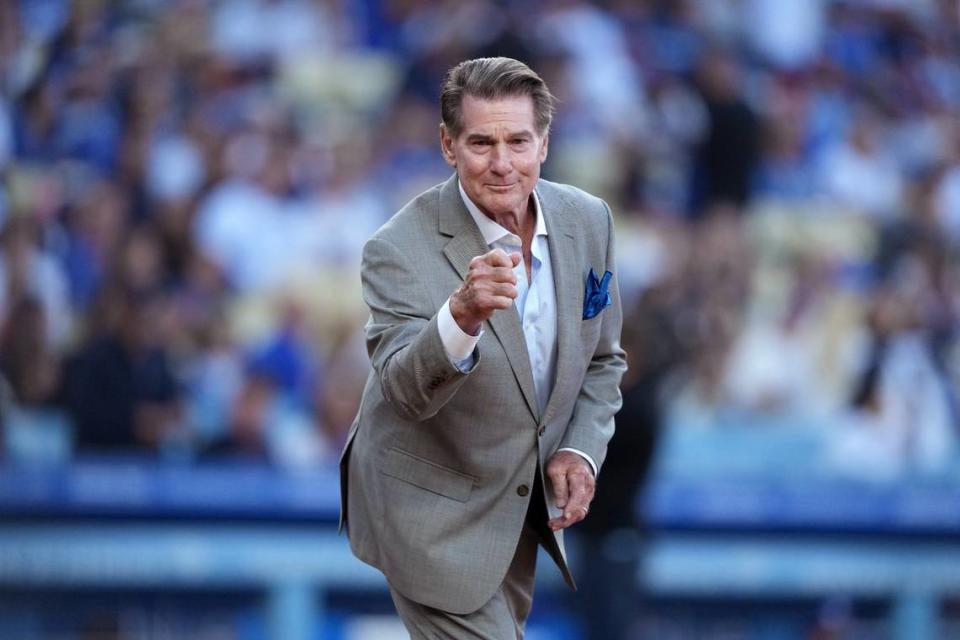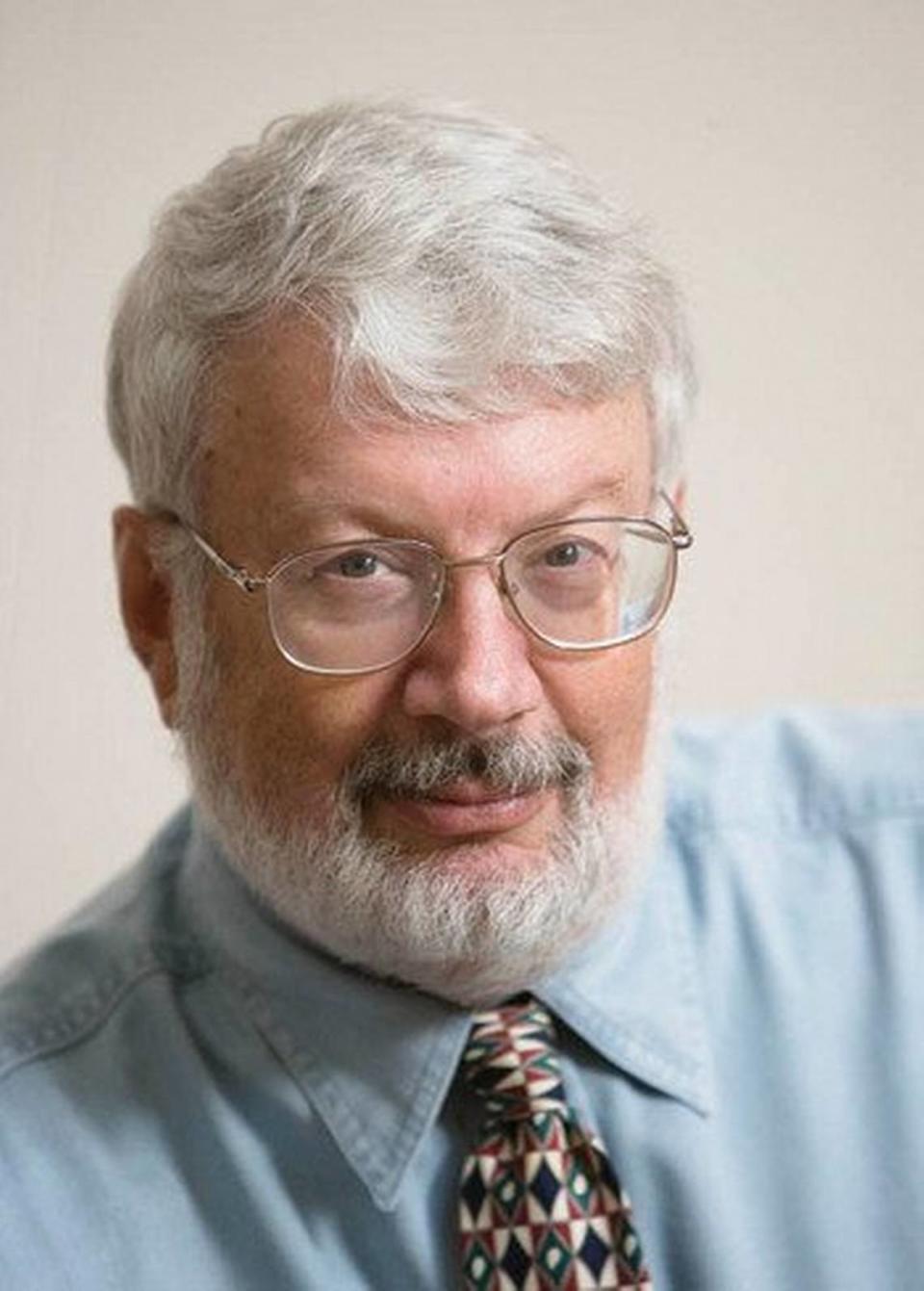Steve Garvey can’t win California’s Senate seat, but he can still hurt Democrats | Opinion
- Oops!Something went wrong.Please try again later.
- Oops!Something went wrong.Please try again later.
- Oops!Something went wrong.Please try again later.
Former baseball star Steve Garvey won’t be California’s next senator, but Democrats should take his Republican campaign seriously because he could still do enormous damage to their political prospects.
Garvey’s odds of winning the seat are slim, but GOP leaders understand that if he comes in first or second in the March primary — and thus advances to the November runoff — he could boost Republican turnout across the state. That would help GOP candidates in six key battleground Congressional races, including Congressional Districts 13, 22, 27, 41 and 45, where Republican incumbents John Duarte, David Valadao, Mike Garcia, Ken Calvert and Michelle Steel, respectively, are running for reelection (as well as District 47, which Democrat Katie Porter is vacating to run for senate).
Opinion
Only 45 of 425 House races are truly competitive, according to the Cook Political Report. The outcome of those six contests in California — which each could be decided by a few hundred or a few thousand votes — could determine whether the Republican Party can hold onto their slim House majority (219 to 213, with three vacancies), or whether Democrats can take back the lower chamber in November. Given Garvey’s celebrity status, a race between him and any Democrat could increase GOP turnout and influence those races.
Garvey could make the runoff
Since he formally announced his campaign in October, Garvey has significantly improved his standing in the race to fill the vacancy left by the late Sen. Dianne Feinstein.
A UC Berkeley/Institute for Government Studies conducted in late August found that Porter and Rep. Adam Schiff were leading the field with 20% and 17% voter support, respectively. Garvey was tied at 7% with Rep. Barbara Lee.
In its most recent poll, conducted in early January, 21% of likely voters backed Schiff and 17% were behind Porter — roughly the same as the August survey. Garvey’s support, however, had increased to 13%. Another 9% of voters supported Lee, and four other Republicans — Eric Early, James Bradley, Sharleta Bassett and Jonathan Reiss — had a total of 11%. About one-fifth of likely voters said they were still undecided.
If Schiff, Porter and Lee split the Democrats’ vote and Garvey consolidates most Republican voters and attracts some baseball-loving independents, he could make the runoff.
Garvey would have a difficult time defeating a Democrat. After all, of the state’s 22 million registered voters, 49% are registered Democrats, 24% are registered Republicans and 22.5% are of “No Party Preference,” according to a recent report by the California secretary of state. The last time a Republican won a statewide race in California was in 2006, when Arnold Schwarzenegger beat Democrat Phil Angelides for governor.
From “all-American boy” to considerable controversy
The 75-year old Garvey is a baseball legend who played for the Dodgers (1969–82) and the San Diego Padres (1984–87) in the two largest voter-rich metropolitan areas in the state. He was a 10-time All Star, Most Valuable Player in 1974, and led the Dodgers to a World Series championship in 1981 and the Padres to the National League pennant three years later.
As a ballplayer, he was popular with fans, cultivating an image as an “All-American boy” who didn’t smoke, drink or use drugs. He was good-looking, polite and always available to reporters, who returned the favor with positive coverage.
Since retiring from baseball, he’s remained in the public eye — sometimes with considerable controversy. He earned substantial payments for promoting everything from reverse mortgages (where you can “hit a grand slam”) to “Exercise in a Bottle” diet supplements. (Garvey, and the company he was representing, were sued in 2000 over false claims made in diet commercials.) As a motivational speaker, he charged at least $10,000 to explain how to apply “the principles of teamwork” to enhance professional performance.
Garvey fathered a number of children with women he was not married to, leading to at least one paternity suit. He has a history of financial recklessness. According to a 2006 Los Angeles Times article, while he lived at a Park City, Utah ski resort, Garvey drove luxury cars, shopped in expensive stores and traveled extensively while writing bad checks and stiffing his employees. His gardener went to small claims court to recover $1,773; a caterer sued Garvey for an unpaid $14,000 bill; he owed his lawyers more than $300,000; and he even failed to pay a nanny who took care of his kids. In 2003, Garvey bid $2,700 for several items at a church charity auction, but then failed to pay the bill.
A future in politics?
In 1981, while still a player, Garvey considered a future in politics, including a possible run for Senate. But now, four decades of considering a run for public office later, Garvey does not seem to have devoted any significant time to learning about California’s issues.
In recent candidates’ debates, he revealed a weak grasp of current issues. He’s been extremely vague, simply resorting to words like “common sense” and “compassion” as a substitute for real policy ideas. In this week’s debate, he was asked where he stood on background checks and other solutions to gun violence. He said that if he goes to the Senate, he’ll reflect what Californians want, but nobody could pin him down on what that meant, and he never said whether he supported or opposed background checks.
Soon after he announced his Senate campaign last year, Garvey slowly began to travel around the state talking to various groups and having photo-ops at homeless shelters and other places. He said he was doing that to learn first-hand about the state’s problems — as if spending 45 minutes at a homeless shelter would provide him with any real knowledge of the causes of homelessness or various solutions.
Notably, Garvey voted for Donald Trump twice, but won’t say whether he’ll do so this year.
The United States, and particularly California, has a long history of athletes and other celebrities jumping into the political arena and winning public office. Since the early 1900s, more than 100 former professional ballplayers have been elected to public office, including two U.S. senators.
One might be tempted to view Garvey as just another narcissistic, hollow man who has lived a life in adulation and simply can’t give up the limelight. But in the age of Trump, it is clear that financial and sexual scandals — or a weak understanding of policy matters — don’t disqualify someone from running for (or even winning) political office.
Garvey might not be measuring the drapes in a future Senate office, but Democrats should be measuring his potential impact in helping the GOP hold on to the House.
Peter Dreier is a professor of politics at Occidental College. His most recent book is “Baseball Rebels: The Players, People, and Social Movements That Shook Up the Game and Changed America” (2022). Kelly Candaele, a former union organizer, is a documentary filmmaker. He produced the documentary film “A League of Their Own,” about his mother’s years in the All American Girls Professional Baseball League, that inspired the Hollywood film of the same name.



